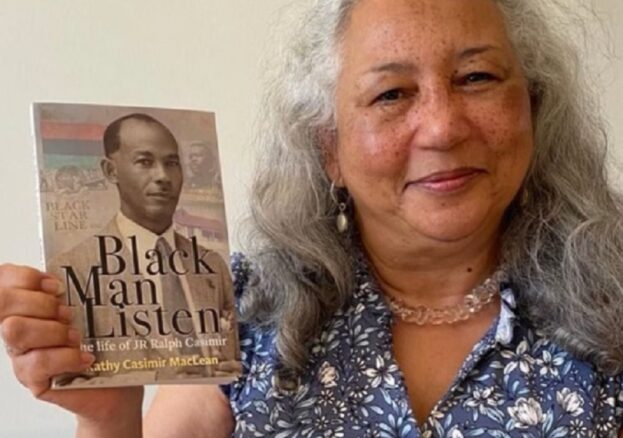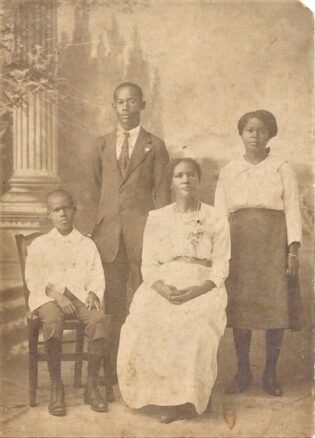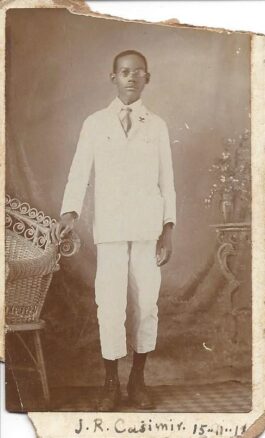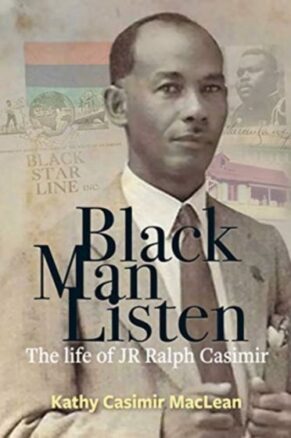
I want my children and grandchildren to know who their ancestors were, how they lived their lives and their stories.
I was fortunate that I grew up in an extended family in Dominica with my maternal great-grandmother, Marie Lucie Olivaccé who continuously told us stories of the family and her past. She spoke of her parents who had eloped from Martinique to escape censure from her mother’s family. They disapproved of their white daughter’s relationship with a man of mixed heritage. She told stories of her life growing up in the village of Soufriere. My mother and my aunts would join in and talk of their childhood, their celebrations, scrapes and escapades. There was also sadness; the death of my grandmother in childbirth, how my mother had become an orphan; the nephew who was poisoned, the babies lost. My twice great grandfather, Peter Léger, was the local Registrar as well as an estate owner so I knew what was described was a life of a family of some importance and privilege.

In contrast, I grew up knowing a lot less about my father’s family. I had gleanings of my grandparents’ history, but it was much later that I became aware of my paternal grandfather, Ralph Casimir’s activities and his importance to Dominica’s own story. I had known that he wrote poetry as it occasionally appeared in the local newspaper and then when I was studying in Bristol, he would send me his latest poetry anthology. However, it was not until the 1990s when I read in the Dominica Chronicle, the serialised version of A Pan African In Dominica by Tony Martin, a Professor at Wellesley College, that I knew the extent of his connection to Marcus Garvey and the Universal Negro Improvement Association.
In 2012, I was invited to speak about my grandfather’s poetry at the Nature Island Literary Festival in Dominica. In preparing for this event, I discovered that he had compiled Dominica’s first poetry anthologies and that his political activities and involvement had gone beyond the brief period of UNIA activity on the island, (1919 – 1923). At the end of my talk, there were people in the audience who wanted to share their memories of my grandfather. Those who did, spoke with warmth, affection and respect and I realised his story needed to be told.
My research into his life began with a visit to the Schomburg Center for Research in Black Culture in New York where my grandfather’s documents (The JRR Casimir Papers 1919 – 1981) are held. There I found a wealth of material related to Casimir’s UNIA activities, his interests in Black history, rare publications and his poetry. Much of this was already in the public domain via Martin’s writings and the Marcus Garvey UNIA Papers.
I had known my grandfather as a relaxed and elderly man and was surprised by what I now learnt. I needed to know much more to understand his ideology and motivation. Many of his books and some papers had been donated to the Roseau Public Library in Dominica after his death, so this was my next port of call. What I found added to my knowledge of his interest in literature and writing poetry and of those he corresponded with, including Langston Hughes and Sylvia Pankhurst.
But there was something missing from the picture, it was then that my father casually mentioned that he had a file with some more personal family papers. This was pure gold as amongst it all was a diary that Casimir had kept up to 1925. There were also letters from his mother and brother.
 Throughout the documents that I came across were references to him having been a councillor and involved in other local political activity, however I could find little concrete detail. My next step was to research newspapers published during the relevant period. I found not only articles relating to Casimir’s political activities but the context in which they took place, how they were received by those in power. I also interviewed my aunts and his friends to acquire a rounded view of the man. Black man Listen: The Life of JR Ralph Casimir is the result of my research.
Throughout the documents that I came across were references to him having been a councillor and involved in other local political activity, however I could find little concrete detail. My next step was to research newspapers published during the relevant period. I found not only articles relating to Casimir’s political activities but the context in which they took place, how they were received by those in power. I also interviewed my aunts and his friends to acquire a rounded view of the man. Black man Listen: The Life of JR Ralph Casimir is the result of my research.
I am endlessly curious about my ancestors and even before I had decided to write a book, I would spend time on Ancestry websites. Family trees fascinate me and from an early age I would construct them with my great grandmother. Through research I have been able to build a more accurate picture of my diasporic family history. In the Ellis Island records, I have found that my maternal grandfather’s family emigrated to the USA from Kassa in Hungary and through DNA testing found my elusive maternal great grandfather.
 Researching my family is a personal interest. I have a yearning to know of the past lives linked to me as they are part of who I am. When one traces one’s genealogy one finds connections to events and people who shaped the past, history is our story because our families were there. However, I know that as I am a descendent of enslaved people, I can never really know the whole story of my African ancestry as there is no documentation to tie me to my African family genealogy, their cultures and traditions.
Researching my family is a personal interest. I have a yearning to know of the past lives linked to me as they are part of who I am. When one traces one’s genealogy one finds connections to events and people who shaped the past, history is our story because our families were there. However, I know that as I am a descendent of enslaved people, I can never really know the whole story of my African ancestry as there is no documentation to tie me to my African family genealogy, their cultures and traditions.
(BLACK MAN LISTEN: THE LIFE OF JR RALPH CASIMIR IS PUBLISHED BY PAPILLOTE PRESS, 2022, £8,99)
